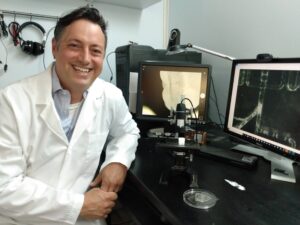In medicine, small is beautiful
Community Conversations by Michael Abraham

Elliot McAllister is pushing health care to a new level. The Blacksburg scientist is using a Star Trek like technology called microfluidics that shows promise to revolutionize medical diagnostics by making testing for a variety of illnesses cheap and fast, literally done by yourself at home. Imaging diagnosing cancer in your own body within 15 minutes for $20.
Microfluidics is the study of behavior of fluids through infinitesimally small micro- channels. Fluids like blood, saliva, and urine behave differently on a microfluidic scale than under normal conditions, and thus these new ways can be tracked and analyzed to show the condition of the human body. Elliot is using innovative 3-D printers of his own design and development to create this sub-sub-sub-miniature devices, literally from his garage/workshop at his home in the Merrimac community outside Blacksburg.
The son of a professor of microbiology, Elliot has a degree in Mechanical
Engineering from the University of New Hampshire and a Masters Degree in Materials Engineering from Virginia Tech. He began his career with a fledgling
company in Philadelphia building all wheel mountain bicycles. He raced their bikes four times on the Iditarod Trail in Alaska in the winter.
Working at Tech, his focus honed in on tiny things. “We’re looking at microscopic things like silicon wafers. How they work is sandwiching layers of conductors, insulators and semiconductors. If you’ve got those things, you can make an integrated circuit. In the 1970’s we were looking at chips that were tens of microns. (A micron is a millionth of a meter.) Now we’re looking at tens of nanometers. (A nanometer is a billionth of a meter.)”
When he left Tech, he started a company of his own called Skyphos. He developed a 3D printing process for doing microfluidics using lab-on-a-chip devices he printed to analyze bodily fluids quickly and cheaply. These are basically computer chips for biology. It is tiny plumbing that is on the cellular scale.
For example, if you have cancer in your body, it is leaving tell-tale circulating tumor cells in the bloodstream. If those cells can be detected quickly and early, the opportunity for treatment and survival goes up dramatically.
“But they are really hard to find,” he said. “You may have one tumor cell in a blood sample of a million other cells. If they are of similar size and physical characteristics of other normal white blood cells, how can you detect them?” They are different enough to separate them through a process of dielectrophoresis where different types of cells react differently based upon being subjected to non-uniform electric fields.
“With this technology, we can test for a variety of diseases, from cancer to sickle-cell, to viruses. We can look at non-biological but fluidic things like drinking water and tell what’s in it. We can do this analysis not in a laboratory but on a flat surface as small as a credit card.
“Years ago, to diagnose strep throat, they’d take a swab of the back of your throat and analyze it in a lab. They’d grow the sample on a Petri dish and analyze it under a microscope. With lab-on-a-chip we can get actionable information in 20 minutes. Now we have this for strep. If my kid tests positive, I can have antibacterial pill in him in 30 minutes.”
The key to Elliot’s technology was making these sub-microscopic chips quickly and affordably. And that he figured how to do by using his own specially modified 3D printers. Nobody had figured out how to use light to fuse liquids into solids at a tiny, tiny level. “There was no physical limitation to how small we could go. So with experimentation and refinement, we were able to produce a wafer card with 20,000 pillars (or channels), all far smaller than a human hair, the size of a credit card.
“So the basis of my company is the ability to make these chips quickly and cheaply. We need the ability to test and fail rapidly in biology. We can actually do this now and we have a couple of customers. We should be able to scale up now. The company is three years old and mostly self-funded, with some investors and advisors.
“I don’t know what our development will do specifically for detection of COVID-19. Potentially we would be able to help other companies develop a diagnostic tool to test for it. Right now, there is no rapid diagnostic test available for COVID-19, to say positive or negative whether someone is infected. If we had one, we’d need to produce and deploy it.
The Holy Grail is that anybody who wants a test can get a test and know within an hour. That, combined with contact tracing, will get COVID-19 under control and let us go about our normal lives.
“The idea behind Skyphos was to develop a medical diagnostic for all sorts of
diseases that could determine positive or negative results quickly and cheaply. We’re further refining to understand making these devices for our customers, who are academic and start-up labs. But essentially we’ve now done that.
“I’m sure we’ll have competitors, but thus far nobody has been able to do what we do.”
Michael Abraham is a businessman and author. He lives in Blacksburg.
